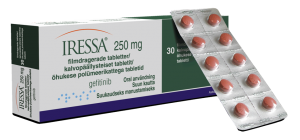Iressa Side Effects
Serious Side Effects of Iressa
If you have been
qualified to use Iressa under the Iressa Access Program (see "
What it's for" tab) and are continuing use of Iressa, be sure to report
any new or worsening symptoms you may have. Since Iressa's withdrawal from the market, it is important to only use Iressa if this medicine
improves your condition. Contact your doctor
at once if you have any of these symptoms:
- worsened condition
- persistent diarrhea and vomiting
- nauseousness and loss of appetite
- eye problems, irritation or redness and changes in the ability to see
- abnormal eyelash growth inside the eyelid
- swelling of the body (especially the hands, arms, lower legs, ankles and feet)
- allergic reaction: hives, rash, swelling of the throat, mouth, lips, eyes, face and trouble breathing
Common Side Effects of Iressa
- dryness or itching of the skin

- mild rash
- increase in acne
- sores in the mouth
- loss of strength
- unexplained weight loss
If your condition
does not improve, let your doctor know right away. Iressa
may not be effective in all patients.
Warnings & Recalls for Iressa
Why was Iressa Taken Off the Market?
Iressa was pulled from the market in 2005 with concerns from the FDA that the risks and benefits of this medicine had not been sufficiently or properly examined. Studies showed than only 10% of patients who used Iressa as a lung cancer treatment showed a decrease in cancer tumor growth rate. For safety, the U.S. Food and Drug Administration has limited the use of Iressa to only persons who have been granted approval by the Iressa Access Program.
What should I use Instead of Iressa?
If you have previously used Iressa and have not been approved to continue usage of this medicine, ask your doctor about other cancer treatments which may work for you. If you have been denied use of Iressa, it is because your doctor feels that other treatments may be more beneficial for improving your condition. Your doctor may prescribe a different medication such as Tarceva or Alimta for treating NSCLC (non-small cell lung cancer).
Iressa Treatment and Use
Iressa | Gefitinib is an epidermal growth factor receptor (EGFR) tyrosine kinase inhibitor medicine which was previously marketed by AtraZeneca for treating non-small lung cancer and breast cancer in patients who have unsuccessfully been treated with other drugs. Iressa works only in patients whose cancer has metastasized.
Approved by the U.S. Food and Drug Administration in May of 2003, Iressa has since been taken off the market along with the FDA’s withdrawal in June 2005. Since then, the FDA has limited the approved use of this medicine and only patients who have been granted approval through the Iressa Access Program should take Iressa. Iressa may continue to be used only by patients who meet the following requirements:
- patients who had previously used Iressa and have benefited from the treatment
- persons who are undergoing clinical trials with Iressa approved by the Institutional Review Board (IRB)
- patients who currently use Iressa and have improved conditions through the use of Iressa
Iressa may only be obtained through the Iressa Access Program. For more information about the withdrawal, see “Warnings and Recalls” tab.
What if I Still Have Iressa?
For patients who still have Iressa at home, be sure to ask your doctor for approval before continuing use. If you have not been approved to use Iressa, stop treatment immediately and ask your doctor for other methods of treatment. Patients who are approved should continue using Iressa as prescribed by their doctor.
Tell your doctor if your condition worsens or does not improve. You may be asked to use a different cancer treatment.
Other Names for Iressa
Brand name:
Generic name:
Lawsuits & Legal Information for Iressa
